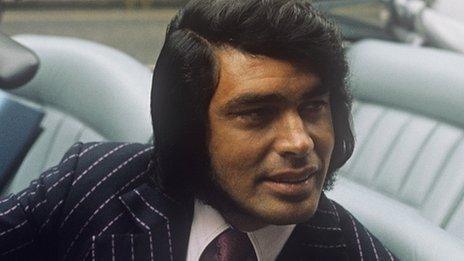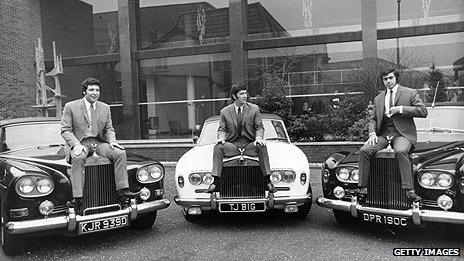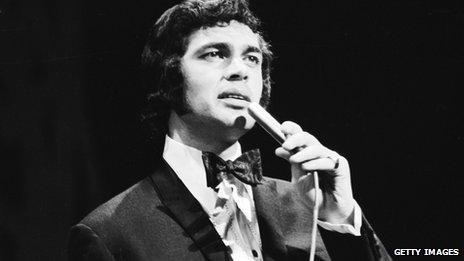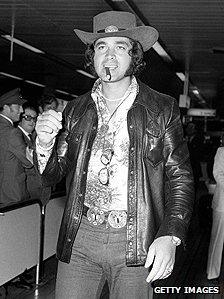Engelbert Humperdinck: the man behind the name
- Published

With his dark hair and square jaw, Humperdinck was an immediate hit with the ladies
Engelbert Humperdinck will represent the UK at this year's Eurovision Song Contest, at the age of 75. But who is the man behind the name?
As names go, Engelbert Humperdinck is right up there with the best Dickens has to offer, overshadowing Martin Chuzzlewit, Edwin Drood, even Uriah Heep.
It is a name so wonderfully odd, that it even inspired comedian Eddie Izzard to one ofhis funniest routines, external.
But rather than literary references, the young Gerry Dorsey looked to classical music for his alias - plumping for a 19th Century composer, best known for his opera Hansel and Gretel.
Born Arnold George Dorsey (later simplified to the stage name Gerry Dorsey) in Chennai, India in 1936, he was 20 years old before the first Eurovision contest was even held.
He released his first single, I'll Never Fall in Love Again, under the name Dorsey, in 1958.
It flopped, and the young singer returned to performing in clubs - until a bout of tuberculosis, in 1961, brought his career to a temporary halt.

Humperdinck (r), along with Jones (l), became one of the biggest-selling UK singers of the 1960s
In 1965, and still struggling to make an impact on the music scene, Dorsey signed with manager Gordon Mills.
Mills had recently taken another aspiring young singer called Tom Woodward, from Pontypridd in Wales, and renamed him Jones - propelling him toward his first major hit, It's Not Unusual.
Mills persuaded Dorsey that he too needed to change his name if he truly wanted a fresh start, and the artist Engelbert Humperdinck was born.
If the overtly sexual Jones was the fire in the fame-hungry duo, then the reserved, romantic Humperdinck was the ice.
With his square jaw, olive skin and plump lips, not to mention sideburns so ridiculously thick and lustrous they each required a barber of their own - Humperdinck more than matched Jones in the heart-throb stakes.

Humperdinck dressed to impress in an evening suit and bow tie
But it was more than his looks: Humperdinck possessed a smooth, almost effortless croon, which harked back to his idols Bing Crosby, Frank Sinatra andDino and the rat pack., external
Though he baulked at the term "crooner".
"No crooner has the range I have. I can hit notes a bank could not cash," he is reported to have said.
It was a voice that, in 1967, when The Beatles were at the height of their creative powers - about to release the game changing Sgt Pepper's Lonely Hearts Club band - kept the world's biggest band from the top of the singles chart.
Humperdinck's big band cover of Release Me held off the, not insubstantial, challenge of the Beatles' double A-side Strawberry Fields/Penny Lane for six weeks. It went on to become the highest-selling single of 1967.
Two more ballads, There Goes My Everything and The Last Waltz, drew a wealth of new fans - now nicknamed "Humperdinckers", and reputed to include the young Princess Anne.
With a string of successful albums, Humperdinck was one of the pre-eminent balladeers of the 60s, both in the UK and beyond.
Like Jones, he even fronted his own US TV show - though it was cancelled after six months. "It happens," he told chat show host Rosie O'Donnell in a 1996 interview.
In the 1970s, with longer hair and a beard, the broad-shouldered singer resembled a power-lifting Bee Gee.
And in 1976, around the time the Gibbs were themselves about to seize the limelight, Humperdinck recorded another of his biggest hit records, After the Lovin.

Humperdinck's UK popularity began to wane in the 1970s
The song became a top 10 hit in the US and was nominated for a Grammy, while the album of the same name was another double platinum hit in the States.
However, the single failed to chart in the UK and marked a dip in his popularity on home shores.
Humperdinck, who continued to tour worldwide throughout the 80s and 90s, had something of a UK career revival in the early 2000s following an advert appearance alongside comedian Peter Kaye.
In 2010, it was revealed that Gorillaz frontman Damon Albarn had approached Humperdinck to sing on their third studio album Plastic Beach.
Humperdinck's management, unbeknownst to the singer, had rejected the offer.Speaking to the website Undercover News, external, Humperdinck called it "the most grievous sin that had ever been committed".
He added: "I wouldn't do a thing like that. The Gorillaz? My God! I would jump on it like a ton of bricks".
Fast forward another couple of years, and, at 75, Humperdinck finds himself at the centre of a major cultural event, representing the UK at this year's Eurovision.
After years of humiliation in the contest for the UK, Humperdinck - who has a large fanbase in eastern Europe - has as good a chance as any other artist to bring the title back to Britain.
"I'm excited and raring to go and want the nation to get behind me!" he says.
- Published2 March 2012